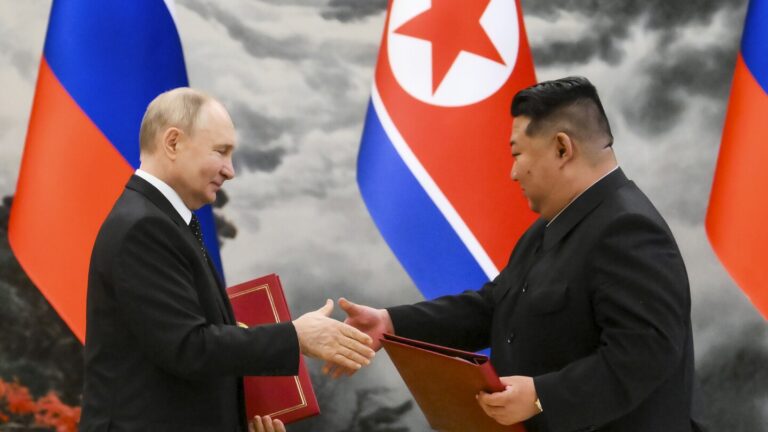BEIJING (AP) — With no clear choice, China appears to be keeping its distance. Russia and North Korea are getting closer The new defense pact could tip the balance of power among the three authoritarian states.
Experts say Chinese leaders are likely concerned about a possible loss of influence over North Korea following the meeting between North Korean leader Kim Jong Un and Russian President Vladimir Putin. The contract was signed this weekwhich could increase instability on the Korean peninsula, but Beijing may struggle to come up with a response due to its competing goals of maintaining peace on the Korean peninsula while countering the United States and its Western allies on the global stage.
Beijing has not yet commented on the agreement, which sees the two countries Providing defense assistance North Korea merely repeated boilerplate statements that it was ready to cooperate closely with the North if either side was attacked and that it would maintain peace and stability on the Korean Peninsula and promote a political solution to the division of North and South Korea.
Victor Cha, senior vice president for Asia and Korea at the Center for Strategic and International Studies (CSIS), said China’s response was “very weak,” adding that it could be a sign that Beijing doesn’t yet know what to do.
“Either option is a bad option,” he said. “Either you can’t decide because there are very strong opposing views, or you can’t decide because you don’t know how to evaluate the situation.”
While some in Beijing might welcome cooperation between Russia and North Korea as a way to resist American dominance in world affairs, Cha said there is “a lot of discomfort in China” – China doesn’t want to lose influence over Russia’s neighbors, it doesn’t want an unstable nuclear power on its doorstep, and it doesn’t want to bring the conflict in Europe to Asia.
But China has not publicly voiced those concerns. “China does not want to push Kim Jong Un further into the pocket of President Vladimir Putin,” Cha said, referring to the two countries’ leaders.
Chinese Foreign Ministry spokesman Lin Jian declined to comment on the new agreement. “Cooperation between Russia and North Korea is a matter between two sovereign states. We have no information on related matters,” he said, referring to North Korea by its official acronym, the Democratic People’s Republic of Korea.
White House national security spokesman John Kirby told reporters that the Russia-North Korea deal “should be of concern to any country that believes in compliance with U.N. Security Council resolutions,” which impose sanctions to stop North Korea from developing nuclear weapons.
Kirby also said the agreement “should concern anyone who cares about supporting the Ukrainian people, and I believe the People’s Republic of China shares those concerns.”
Alexander Gabuev, president of the Carnegie Russia and Eurasia Center, said one thing that could concern China is whether Russia would share advanced technology to help North Korea develop weapons.
“If China is truly concerned, it has influence over both Russia and North Korea, and it would probably try to impose some limits on that relationship,” he said.
The meeting between Putin and Kim Jong Un this week was the latest chapter in decades of complex political and military relations in East Asia, where a once-weakened power, China’s Communist Party, has emerged as a major player in both North Korea and Russia.
This and other developments have raised concerns in the United States that China, now the world’s second-largest economy, could challenge the U.S.-led global order by aligning with countries such as Russia, North Korea and Iran – an allegation that China denies.
Seung Yun, director of the Stimson Center’s China program, said Beijing does not want to form a tripartite alliance with North Korea and Russia because it “needs to keep its options open.”
Such an alliance could mean a new Cold War, something Beijing is determined to avoid, she said, adding that being tied to Pyongyang and Moscow would go against China’s goals of maintaining ties with Europe and improving ties with Japan and South Korea.
Sun added that improved ties between North Korea and Russia “create the possibility and potential for uncertainty, but given what has happened so far, I don’t think this has harmed China’s national interests.”
Danny Russell, who served as the top US diplomat for Asia under the Obama administration, said a closer relationship between Putin and Kim Jong Un could weaken Beijing’s influence and make China the “biggest loser”.
“Apart from annoyance at Putin’s meddling in what most Chinese consider to be their sphere of influence, the real loss for China is that Russian support gives North Korea greater impunity and room to act without regard for Beijing’s interests,” he said.
Russell, now vice president for international security and foreign affairs at the Asia Society Policy Institute, said Kim is keen to reduce his country’s reliance on China.
“Weakening Chinese influence means Kim Jong Un can ignore Beijing’s calls for restraint,” he said, “making chaos much more likely at a time when (Chinese leader) Xi Jinping desperately wants stability.”
___
Tan reported from Washington. Associated Press reporters Will Weisert and Matthew Lee contributed from Washington.

